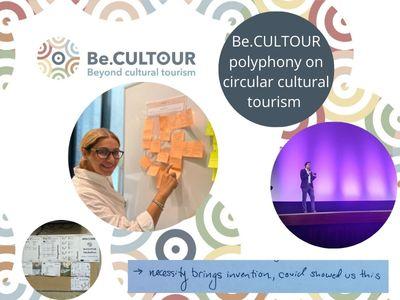
What does circular sustainable tourism mean to you?
“A tourism model that respects and takes into account the local economy, respects, promotes and valorises the natural environment and the local culture.”
- Pauline Alexopoulou, Larnaca and Famagusta Districts Development Agency - Cyprus Pilot Heritage Site
What idea developed during the Be.CULTOUR project are you excited about?
During the Policy Learning Lab, we talked about an EU-wide platform for circular cultural tourism, which lists tourism and hospitality entities who conform with a set of circular cultural tourism guidelines (that will have to be developed). The platforms would function as a one-stop shop for visitors to book circular cultural tourism and hospitality products. Visitors would benefit from an easy-to-use platform, where they could filter and select products and services in line with their interests, while communities/ local providers could prevent economic leakage and enhance awareness of their local heritage.”
- Leonie Schulz, LIVE Ecomuseums - Cyngor Gwynedd Council, UK
What good examples of approaching the transition towards circular cultural tourism do you know?
Culture, heritage and tourism are all about INSPIRATION – and digitalization tools – apps, e-guides, QR code signs et al. – with all the right information accessible, save one of the most valuable of resources – the time (and trees/paper!), giving visitors the opportunity to focus, enjoy more and energize themselves on their travels (quests for genius loci) with their kind of mind, body and soul-food!
- Igor Pucarevic - Vojvodina, Serbia Pilot Heritage Site
What does innovation in cultural tourism mean to you?
Innovation in cultural tourism goes beyond a small focus on economic profit. It combines inclusive economic profit with improving the wellbeing and resilience of its community.
- Robbert Mantel - Stadsregio Parkstad Limburg, the Netherlands
The polyphony of voices from various regions, mainly in peripheral, undervisited and underdiscovered areas, occurred also during the study visit to Heerlen in the Netherlands with examples of sustainable ambitions in the post-industrial city, workshop sessions and discussions. The Be.CULTOUR community is committed to look for various ways in making cultural tourism a means for wellbeing and resilience, where visitors and local stakeholders enjoy cultural and natural heritage.
While the COVID-19 pandemic showed the necessity of invention in sustainable tourism, the examples presented in Brussels convinced the crowd that creativity in designing new solutions is crucial. The strategies might include emotional spaces for new exploration and invention, such as storytelling on local cuisine in untouched settings of nature, gaming enabling immersive experience with local legends. Based on the Be.CULTOUR approach, the reflection on possibilities is based on co-creation and co-implementation in an inclusive way. The whole process started with mapping of stakeholders at micro (like local communities, minorities, small enterprises) and macro levels (like political authorities, international networks). This is just the beginning of the journey with Be.CULTOUR. In the coming months the ideas for circular cultural tourism will get a tailored boost during the Acceleration Program and the actions developed by the communities in participating regions will be prepared for implementation. Cultural tourism is changing itself. Stay tuned, new destinations with unprecedented heritage are getting ready for circular tourism!
